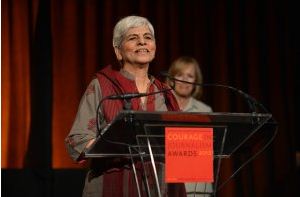Published: 29 November 2012
Country: Pakistan
 Zubeida Mustafa was the first woman reporter for a mainstream media organization in Pakistan.
Zubeida Mustafa was the first woman reporter for a mainstream media organization in Pakistan.

When she became assistant editor at English-language daily newspaper Dawn in the 1970s, Mustafa faced many gender barriers. For example, when she asked for permission to join then-President Muhammad Zia-ul-Haq’s press entourage on a trip, she was told it was strictly a “stag party.”
From these days until today, many things have change in Pakistan, but but not all of them for better position of female reporters and women journalists.
Mustafa, who was recently awarded the 2012 Lifetime Achievement Award by the International Women’s Media Foundation (IWMF), was a pioneer in reporting on women’s issues, and also covered politics, education, health and culture.
Mustafa spoke with IJNet about her three-decade journalism career, and present-day challenges faced by women journalists.
She says that “the environment is better in the sense that the press laws of the ’60s, ’70s and the first half of the ’80s are no longer there”. “But today there is more violence. Journalists can be–and are–killed if some powerful higher-ups don’t like his or her story and feel it will undermine them”, says Pakistan’s first woman reporter.
Mustafa explains that “women journalists face similar pressures as their male colleagues, but apart from the areas where the Taliban are in control, women do not face the social stigma as women of her generation did when we started working in unconventional jobs for women, such as journalism”.
Read full Mustafa’s interview for IJNet here
Photo courtesy of Stan Honda/International Women’s Foundation (IWMF)